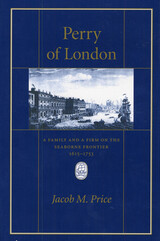
In a model study Jacob Price illuminates the dynamic growth of Britain’s foreign trade in the eighteenth century through an investigation of the investment patterns and credit institutions that financed that expansion. Concentrating on the trade between Britain and the Chesapeake tobacco colonies of Virginia and Maryland, for which a unique set of records exists, Price surveys the ways in which commerce developed and working capital was mobilized in Britain to support expanding overseas trade.
Price develops the clearest picture ever of the financial environment within Britain as it affected Southern colonies in the preindustrial age. He does so by determining the kind of capital resources merchants in foreign trade actually commanded and measuring how much of their own wealth merchants brought to trade. In great and absorbing detail he discusses also the development of merchant-oriented banks in London and other ports, reinvestment of profits, long-term borrowing on bond, and the long-term credit provided to export merchants by wholesalers in textiles, ironmongery, and other industries.
The relationship of debt to the coming of the American Revolution is also treated. Tobacco growers suffered more than others from a psychological unease caused by immense debt and were more revolutionary than farmers with less intensive capital needs and, hence, with lighter debt. This history will enlighten Anglo-American historians, economic historians, and historians of the American revolutionary era.

The Establishment of English colonies in North America and the West Indies in the seventeenth century opened new opportunities for trade. Conspicuous among the families who used these opportunities to gain mercantile and social importance was the Perry family of Devon, who created Perry and Lane, by the end of the century the most important London firm trading to the Chesapeake and other parts of North America.
Jacob Price traces the family from Devon to Spain, Ireland, Scotland, the Chesapeake, New England, and London. He describes their relationships with Chesapeake society, from the Byrds and Carters to humble planters. In London, the firm’s patronage gave the family high standing among fellow businessmen, a position the founder’s grandson utilized to become a member of Parliament and Lord Mayor of London. In the end, the grandson’s political success as an antiministerialist brought the family the enmity of the prime minister, Sir Robert Walpole, and contributed to the downfall of their firm.
The Perrys’ story reveals the interrelatedness of social, commercial, and political history. It offers an important contribution to our understanding of the nature of the Chesapeake trade and the forces shaping the success and failure of English mercantile enterprise in the seventeenth and eighteenth centuries.
READERS
Browse our collection.
PUBLISHERS
See BiblioVault's publisher services.
STUDENT SERVICES
Files for college accessibility offices.
UChicago Accessibility Resources
home | accessibility | search | about | contact us
BiblioVault ® 2001 - 2024
The University of Chicago Press









